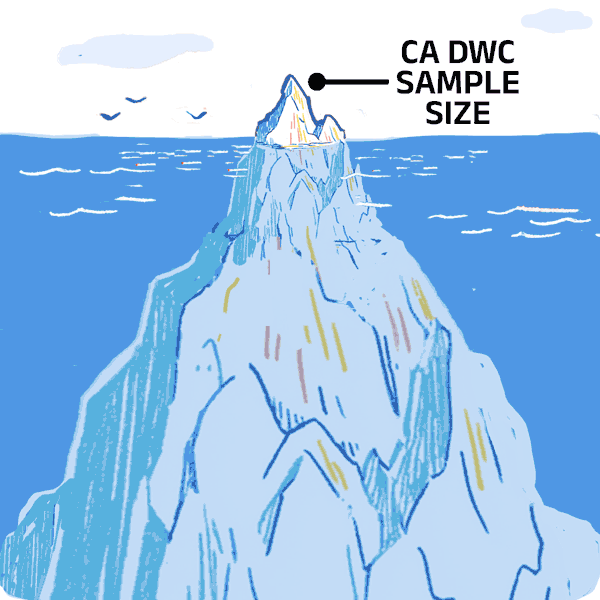CHSWC Steps Up—Tackling PTSD & Wasteful "Studies"

Last week’s meeting of California’s Commission on Health and Safety and Workers’ Compensation (CHSWC) made something clear: the Commission is serious about fixing what’s broken in workers’ comp.
From a powerful first-person account of post-traumatic stress on the front lines to a laser-focused interrogation of how California awards public dollars for research, CHSWC displayed a refreshing combination of compassion, rigor, and accountability.
We applaud CHSWC’s approach.
The Commission isn’t afraid to name problems and demand real solutions. It appears independent of claims administrators, payer services entities, and the private equity firms backing them.
From what we saw, CHSWC has a fundamental goal that daisyBill shares: tackling systemic wrongs so providers can treat and injured workers can heal.
Straight From the Workers: A Dispatcher’s Testimony
The most impactful moments of the meeting came during testimony from Cerena Lewis, a 10-year veteran dispatcher for LA County Fire.
According to Ms. Lewis, dispatchers manage up to 150 emergency calls per shift, navigating life-and-death scenarios over the phone at a relentless clip. She shared a few of her harrowing calls—and challenged Commissioners and other attendees to consider the mental-health impact of handling dozens or more such calls daily.
Ms. Lewis made the stakes clear: dispatchers absorb trauma, and the consequences are real, lasting, and diagnosable as work-related injuries—yet care remains inexcusably, indefensibly elusive.
In addition to her traumatic calls, Ms. Lewis shared the story of a colleague with 27 years of service and 30 documented traumatic incidents who was ultimately forced into retirement after his Post-Traumatic Stress Disorder (PTSD) claim stalled for years.
Ms. Lewis' stories were not outliers. California Senate Bill 623 requires CHSWC to submit a report analyzing dispatchers' and other front-liners' PTSD struggles. Lewis also invited CHSWC Commissioners to do a “sit along” with LA County Fire dispatchers to hear calls firsthand.
Commissioners thanked Lewis and expressed deep and evidently sincere concern. One even noted that current system incentives make it easier to fight cumulative trauma claims than treat them, stating (emphases ours):
“We need to make it easier for you and your co-workers to get that treatment that we just hear about this over and over and over again, especially when it's more of a cumulative trauma…there is this really insidious and pervasive perspective out there, that it's not real, and that these claims should be fought and just throw as much money as you need to at that claim to fight it.”
While Commissioners were careful not to call out particular claims administrators, it was hard not to think of Sedgwick Claims Management Services, Inc., which manages some of the LA County Fire Department's claims.
Yes, that's the same Sedgwick that boasted of derailing 54% of treatment requests for injured workers, resulting in a solid "return on investment" for its clients.
RFP Reform: Time to Stop Feeding RAND?
CHSWC also scrutinized the Request for Proposal (RFP) process, the mechanism through which California procures research services for the state, including commissioning studies to analyze and improve workers’ compensation.
According to the Commissioners, those studies too often fail to deliver.
Speakers pulled no punches, criticizing the implausible lack of competition for these publicly funded research contracts in the world's 5th largest economy. Specifically, Commissioners noted that RAND Corporation receives contracts with little to no challenge despite repeated concerns about scope, methodology, and lack of insight.
Commissioners cited one case where the state paid RAND $250,000 for a study that interviewed only 13 workers statewide.
As daisyNews reported, California now intends to hand RAND another $300,000 to analyze non-existent data. However, if this meeting is any indication, CHSWC will pay close attention to the "return on investment" for California taxpayers.
CHSWC Is Doing the Work
The meeting wasn’t just talk. It demonstrated how serious, accountable analysis can illuminate the darkest corners of the broken comp system.
From Cerena Lewis’s testimony to the Commission’s sharp critique of potential “research” waste, CHSWC demonstrates what it means to prioritize real-world outcomes.
CHSWC seems to understand that every unnecessary delay in care has a human cost, and scrutinizing the details can help make it easier for providers to treat and for injured workers to heal.
We’ll continue reporting on—and supporting—CHSWC’s efforts to make real change.
Make treating injured workers an easy decision. Let daisyBill erase the friction—click below to learn more
SOLVE WORKERS’ COMP BILLING
DaisyBill provides content as an insightful service to its readers and clients. It does not offer legal advice and cannot guarantee the accuracy or suitability of its content for a particular purpose.





